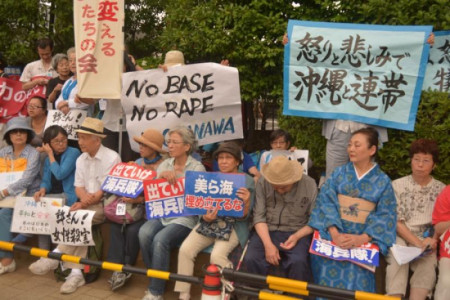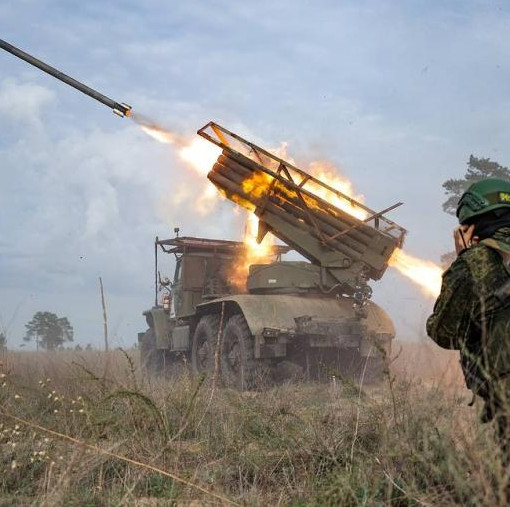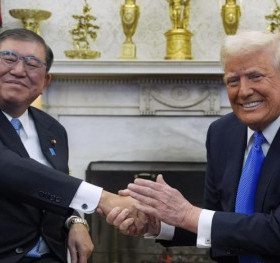
Governor of the Japan’s Okinawa prefecture Dеnny Tamaki has refused to approve plans for relocating the island’s largest American military base. October 12 saw him announce intent to sue the Japanese government on the issue. Tokyo, in its turn, is preparing counterclaims, though mostly to comply with legal conventionalities. Legal loopholes let the government do without Okinawa's approval, but the matter seems to have left the legal framework to enter the political and propaganda ones.
In 1996, Tokyo and Washington agreed on a plan to move the Marine Corps Air Station Futenma (or MCAS Futenma) from the densely populated city of Ginowan to outskirts of the remote Henoko village in Okinawa. Still, local residents and authorities have long been strongly opposed to keep the base within the prefecture, where about 70 per cent of Japan’s US military facilities are located. Even though the prefecture itself occupies a mere 0.6 per cent of the country's territory.
The US contingent in Japan is the largest in Asia and exceeds 40,000 people. At some point, the US Air Force flew from Okinawa to bomb North Vietnam, and later they supported operations in Afghanistan and Iraq. And now that political oracles herald a conflict between China and the United States over Taiwan, Okinawa’s vitality is getting even higher. The Americans do not certainly want to leave — and they won't.
The problem has always been that US servicemen in Japan treat the locals what might be charitably described as "improperly". Drunk brawls have become commonplace, with even rapes and murders. And both the bases and their personnel are exterritorial, i.e. unbound by Japanese law, which is typical of colonial relations. But that's not the half of it!
Local residents incidentally suffer from combat aircraft or helicopter spare parts falling from above, such as service tanks, etc. Exercises, shootings, troop movements — all of this is not just annoying, but damaging to the environment, fisheries and unique coral beaches of Okinawa, Japan's best seaside resort. The latest scandal occurred during the COVID pandemic, when American bases turned out to have defied Japanese shutdown rules, bringing the prefecture’s morbidity level to a record high.
All of this was a taboo in the country’s mainstream media and the government until the mid-90s, but they did stir the pot nevertheless, especially in Okinawa. However, a horrible rape and murder of a minor forced then Prime Minister Ryutaro Hashimoto to take up the base transfer matter with the Americans, entailing a truly unpleasant precedent in the Japanese-American military alliance.
Besides, no Japanese prefecture agreed to accept the facility, and it was simply moved away from Okinawa’s uptown areas. This caused the current conflict, which is not even going to end if Tokyo steamrolls its decision at the end of the day.
In December 2022, amid its growing regional confrontation with the PRC, the Japanese government announced plans to double its defense spending over the next five years, referring to China’s growing threat. The plans also embrace creation of new military facilities both in Okinawa itself and the adjacent islands. So, February saw a new base of the Ground Self-Defense Force open in the prefecture’s Ishigaki Island. The 47-hectare garrison area houses 570 military personnel and 200 pieces of equipment, the country’s Ministry of Defense claims. In particular, the base has launchers for Type-12 surface-to-ship missiles and medium-range Type-03 surface-to-air ones.
US military contingent in Okinawa is also expected to enhance.
Here is a new challenge to residents of the prefecture directly adjacent to the potential military theater — incomparable to living next to the troublesome American soldiers. They remember how a quarter of the islanders fell victim to the American assault during WWII. "We must never allow Okinawa citizens experience anything of the kind again," Gov. Tamaki says.
In the 2019 referendum, over 70 per cent of locals opposed the base relocation project. Local deputies have also been extremely opposition-minded. Actually, Governor Tamaki owes his election victory to his irreconcilable base-related stance. This fall even saw him take the issue to the UN in order to galvanize international support and tick off the central government loathing any damage to its global standing.
"The Japanese government is imposing the construction of a new American base in Okinawa," Tamaki said at a September meeting of the UN Human Rights Council in Geneva. The concentration of US bases threatens peace, and a military build-up contradicts his people’s peaceful aspirations, he claimed.
"I would not have had to come here if the Japanese government had taken due regard of what Okinawa Prefecture residents want, and proceeded with addressing the issue in consultations with the United States," he told reporters after the speech.
And yet, the forecast development of events is clearly disappointing to him. Experts are sure that all the procedural matters will be resolved by year's end. The US marines are going to stay in Okinawa, along with all the problems causing anxiety with the locals.









